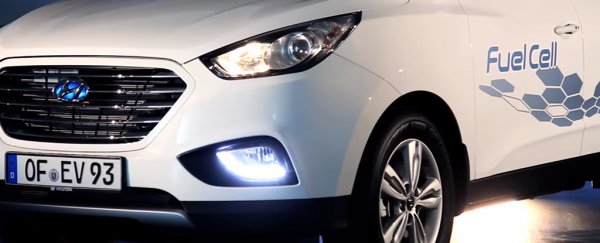There's no doubt that electric cars have a big role to play in the future of personal transport, but they're not the only alternative to petrol-powered vehicles in the pipeline. Cars running on hydrogen fuel cells are also in development, and a new trial in London just showed how much potential they really have.
A Hyundai ix35 Fuel Cell car has just completed a record-breaking 9,810-km (6,096-mile) unbroken trip around the M25 (the motorway that encircles the capital) over the course of six days, stopping only to top-up on fuel. Not only did the car achieve the longest continuous journey ever, it also travelled 643 km (400 miles) on one tank of hydrogen - further than any other fuel cell electric vehicle ever made.
The trial was backed by the London Hydrogen Network Expansion project (LHNE) and is part of a broader push to promote the benefits of hydrogen-powered transportation, which include high efficiency, silent operation, the elimination of greenhouse gases from the whole fuel production cycle, and water as the sole by-product.
These cars are certainly good from the environment: the hydrogen itself can be produced from renewable sources such as water, and is then converted into electricity to drive a electric motor via a lithium-ion battery. Refuelling takes a matter of minutes too.
"What we need now for accelerated adoption of hydrogen vehicles is for the government to work with our industry to provide the right framework for the technology to become truly accepted by the public," said Diana Raine, European Business Manager for Hydrogen Energy Systems at Air Products, the firm leading the LHNE project.
The six-day, 50-lap run out in the Hyundai ix35 was completed by a team of drivers and included detours to four of the UK's hydrogen refuelling stations for top-ups. There are currently six of these refuelling stations in the country and the plan is to add six more within the next 12 months – crucial if more people are going to take the plunge and switch to hydrogen-powered transportation.
Hyundai's car has actually been commercially available since 2014, while last year Toyota introduced its Mirai FCEV (Fuel Cell Electric Vehicle). Honda's FCV Clarity is due to arrive at some point during 2016, while Mercedes, BMW, Volkswagen, and Audi are among several manufacturers known to be developing FCEVs for the future.
The record-breaking journey was part of a designated Hydrogen Week, designed to raise awareness of the benefits of FCEVs. Meanwhile a fleet of eight hydrogen-powered buses have now clocked up more than 112,6540 km (700,000 miles) along a popular route in Central London.
